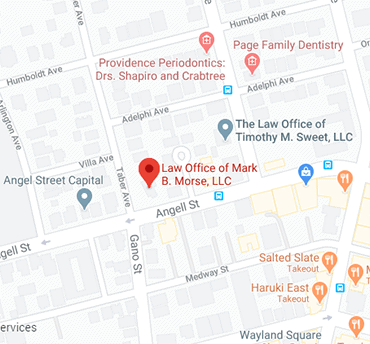Divorce And Money In Rhode Island: Alimony And The Division Of Assets

- Who pays alimony after a divorce in Rhode Island, and how much are they likely to pay?
- How long does alimony last in Rhode Island, and when and how can it be modified?
- What does the equal distribution standard mean for the division of assets in Rhode Island divorces?
What Is Alimony Or Spousal Support In A Rhode Island Divorce?
When a couple enters a marriage, they will try to build something together, but rarely on equal footing. Someone’s income is inevitably higher than the others; maybe one even has to give up a job or career opportunity to support their partner, move with them, or raise children.
If that marriage falls apart, it can leave one of the two former spouses seriously stranded, unable to scrape by, much less maintain the same standard of living. That is where alimony steps in.
These spousal support payments, as they are more properly called in Rhode Island law, serve to rebalance that situation somewhat. The law requires that one partner pay a certain amount of money regularly to help the other get by and build their new life on their own.
How Is Alimony Or Spousal Support Calculated In Rhode Island And Who Pays For It?
When calculating how much alimony will be paid and who will be paying it to whom, there is a vast array of factors the court will consider. These include the length of the marriage, the conduct of each party, the health of both spouses, as well as their occupation and income. Even things like skills, education, and the ability to obtain gainful employment will factor in alongside expenses and other similar considerations.
Once all those factors have been compared, the more affluent spouse with a higher income will usually be asked to pay a certain amount to the less wealthy spouse to help supplement their lower or non-existent income. This is not intended as a permanent solution, however.
How Long Does Alimony Or Spousal Support Last After Divorce?
The exact duration of the spousal support payments required will depend on what the court orders after the divorce. It can also be based on any written agreement signed by both parties about the payment of alimony, for example, during a prenuptial agreement or in a divorce settlement.
Ultimately, it will vary in each situation, depending upon the needs and expenses of both parties and the other factors mentioned above. One thing is certain, however; in all but the rarest circumstances, it will not be permanent.
As in most states, spousal support in Rhode Island is considered to be rehabilitative. This means it is not intended to last forever, but rather to help the person get back on their feet while they rebuild their life or career. Only under extreme circumstances might it be extended indefinitely when the other person is unable to support themselves at all and is unlikely to be able to in the foreseeable future.
If circumstances change, however, as with child support, spousal support in Rhode Island can also be modified later.
Can Alimony Or Spousal Support Be Modified In Rhode Island?
Over time, spousal support is supposed to eventually go away in most circumstances. If a written agreement determines the alimony payments, it should also specify the means and circumstances in which it can be changed or modified.
If the court ordered the alimony, it retains jurisdiction (legal right) to modify it if the circumstances change. Successfully convincing them may require the help of a skilled divorce lawyer, however. The court decree will also usually specify a time at which the payments are to be reviewed, renewed, or ended.
It is also the court that will have been in charge, at the outset of the divorce, for finalizing the division of the couple’s assets, properties, and debts if they could not come to an amicable agreement.
What Properties And Assets Are Subject To Division And Distribution During Divorce?
The first thing to know about the division of assets and property in Rhode Island is that it is not a community property state. This means that not every piece of property is considered divisible under marriage and divorce law.
Inherited property, as well as property acquired before the marriage, is considered to be individual property. Thus, they are not to be divided and should remain with their proprietor.
Marital assets, on the other hand, are those which are acquired during the course of the marriage or have grown in value during the marriage. These are divisible during divorce.
Obviously, there are certain qualifications and exceptions, which is why having an experienced attorney on your side during a divorce can make such a substantial impact on the property division resolution.
What Does Equal Distribution Mean Under Rhode Island Divorce Law?
As with the spousal support, the actual division of assets by the court during a Rhode Island divorce is not systematic. Unlike many states that impose a basic 50/50 split, dividing everything neatly in two and sharing equally, Rhode Island tries to aim for a more equitable distribution.
This means that the goal is to establish a “fair” solution that takes into account all kinds of factors and circumstances. The court would carefully examine the situation of both spouses, their assets and income, expenses and obligations, and, of course, the arguments of their lawyers, then choose how to divide the marital assets accordingly.
In Rhode Island, the court will even take into consideration the exact date of separation when determining asset distribution.
Is The Date Of Separation Important When It Comes To The Division Of Property And Assets In Rhode Island?
Among the many factors the court will consider when allocating and separating assets after a divorce is the date the couple technically separated. It is not the only factor, however.
Just because you were separated does not necessarily mean that the asset you are claiming is going to be a non-marital asset. The court may still consider it a marital asset but might also take into account the timeline of its acquisition when choosing who should obtain its use or retain it after the divorce.
Clearly, Rhode Island’s divorce and property distribution laws are anything but simple. Most people will easily get lost, or worse, tricked, when dealing with them on their own without the help of an experienced attorney. Make sure, even if you seem to be in perfect mutual agreement with your ex, to have any separation agreements or court proceedings reviewed and attended by a lawyer who is entirely on your side.
For legal guidance on Alimony And The Division Of Assets During Divorce In Rhode Island, contact an experienced divorce law attorney near you. Don’t get cheated of a fair division or pay more than your due; call (401) 831-0555 today.

Call Now To See How We Can Help!
(401) 831-0555

